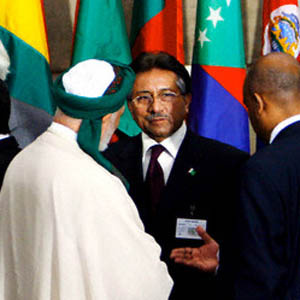The Three Remaining Aces

Approaching the presidential elections of Pakistan, Gen. Musharraf is facing two serious problems these days: one is preserving his gaudy military uniform as the head of the army and the other the struggle to maintain the presidency seat which is not so comfortable these days, since sounds of bomb and grenade explosion shake it every day.
Gen. Musharraf has not achieved these two valuable assets so easily and surely he will not let them go easily. To achieve his uniform he has strived in military bases for years and to seize the presidency seat, he has deposed peoples’ legitimate and elective government with difficulty.
Hence he dears them more than anything else in this world and he insists on participating the presidential elections with the same uniform while sitting on the same seat.
But there’s a small problem here. According to Pakistan’s law “one shall not hold two governmental jobs at the same time”.
Since the General believed in enforcing the law, he had predicted that his tendency to have his cake and eat it would not be overlooked by the independent judiciary body of the country and the watchful judges of “Central Supreme Court” and that could put him into trouble.
Therefore he ordered to frame and dismiss the strict high-rank judge of the Supreme Court with the charge of financial corruption, so that the lower-rank judges find out they shouldn’t mess with him.
But unfortunately this wise, deliberate plan backfired and soon as the news spread, furious people broke out into the streets and vehemently ask for Chaudhry’s return to office. Everyday that passed, the number of demonstrators increased and so did their fury.
And it was so that inadvertently and in a short time, Pervez Musharraf turned an unknown judge into a national hero and ate the humble pie by retaining him in his office. What makes it worse is that with his new image (returning to his workplace on people’s hand) Chaudhry may want to compete Musharraf in the elections.
After General’s failure in rendering the judiciary body impotent and dismissing its independent judge, now he has launched an innovative, asking for co-operation with Binazir Bhutto (former P.M.) who herself is accused of financial corruption and lives as a self-exile in London.
This is the rule of co-operation: by overlooking her charges which have jail sentence in case of being proved, Bhutto will rescue Musharraf’s government by taking part in it. Reportedly, Bhutto’s response to this offer has been negative up to now.
Casting a glance over a country whose name is formed by the initial letters of “Punjab, Afghanistan (because of the country’s north-western frontier), and Kashmir” and has got a history not longer than 60 years, we discover that generals were all infatuated with the desire to occupy the presidency seat and Gen. Musharraf’s ordeals are the same as other military men before him who staged a coup, from Marshall Ayub Khan to General Yahya Khan, General Vali Khan and General Zia-ul-Haq.
The same desire forced Pakistan’s first military dictator, Field Marshall Ayub Khan to abolish all Muhammad Ali Jinnah’s (founder of Pakistan) beloved parliamentary principles, totally dissolve the central and regional parliaments, ban parties’ activities and arrest and lock up political leaders. What remained actually after all these crackdowns was as Zulfikar Ali Bhutto said “selling Kashmir”.
In Bhutto’s reign, due to his chauvinistic propaganda, secessionist feelings led by “Mujib Alrahman” were fostered in West Pakistan instead of East Pakistan and heightened so rapidly that after 9 months of civil war which caused the death of one million people and displacement of several other millions, East Pakistan slipped from Bhutto’s hands and was called Bangladesh. As analyzers believe, the only advantage for Pakistan after all this massacre was its membership in Cento pact which were revoked after the collapse of Soviet Union and the end of Cold War.
Bhutto’s government was toppled by Gen. Zia-ul-Haq’s military coup and Bhutto himself was hung by the charge of financial corruption. Gen. Zia-ul-Haq was killed in a suspicious jet fall and was replaced by the civilian government of Binazir Bhutto. Bhutto was replaced by Nawaz Sharif’s government who himself was toppled by Pervez Musharraf’s coup.
Anyway, let’s get back to General Musharraf’s ordeals: we must wait and see which of the remaining three aces upon General’s sleeves –his Islamic pretentions, his close ties with George Bush in fight against terrorism and asking for Binazir Bhutto’s help to save his flashy uniform and his seat- will make him victorious in this battle.

